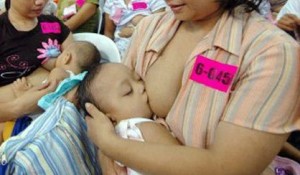
The International Labour Organization (ILO), the United Nations Children’s Fund (UNICEF), and the World Health Organization (WHO), lauded the country for significant increases in exclusive breastfeeding rates, saying recent figures released by the Food and Nutrition Research Institute (FNRI-DOST) showed that exclusive breastfeeding rates have risen from 36 percent in 2008 to 47 percent in 2011.
The statement also noted that the initiation of breastfeeding within one hour of delivery has increased from 32 percent in 2008 to 52 percent in 2011.
But the organizations also said that there were still substantial disparities in exclusive breast feeding rates within the country, saying that data from the recent Family Health Survey (FHS) in 2011 showed that exclusive breastfeeding rates in some areas of the country were as low as 27 percent.
“Further efforts will be needed to increase the exclusive breastfeeding to be truly at the universal level, which will have a significant impact on the nutritional status of children in the Philippines,” the statement said.
Dr. Soe Nyunt-U, WHO representative in the Philippines, for his part, called for the intensification of the promotion of breastfeeding, saying it was important in reducing child mortality and improving maternal health.
“The increase in breastfeeding rates takes us that much closer to achieving the Millennium Development Goals in child health. We should continue to intensify the campaign to promote, protect and support breastfeeding in order to gain more grounds,” Nyunt-U said.
Tomoo Hozumi, UNICEF representative, meanwhile, noted that efforts from various stakeholders were needed to maintain the increasing exclusive breast feeding rates.
What we have seen in recent years is a coming together of many different partners from the government, political leaders, NGOs, other civil society organizations and media to support these efforts. This is the key to sustained improvements in breastfeeding and ultimately in physical and mental development of children in the Philippines,” Hozumi said.
Breastfeeding challenges
The statement also noted that mothers returning to work were facing various challenges, saying that working women faced difficulties with the risk of income loss after giving birth.
“Working women often feel the pressure of immediately reporting back to work and giving up breastfeeding for fear of losing their job or returning to work with lower pay or position,” said Director Lawrence Jeff Johnson of the International Labour Organization (ILO) Country Office for the Philippines.
He said the ILO has been calling for employers’ support for women’s rights to breastfeed during work hours, saying that workplaces should provide space and time for mothers to continue breastfeeding.
The statement also noted that strong policy and legal framework, that was in line with globally agreed codes of conduct to regulate the marketing of breast milk substitutes such as infant formula, were important factors needed to create a supportive environment for breastfeeding.
Hozumi said that the country’s legislative and policy framework was recognized as one of the best in the world, particularly the Milk Code or Executive Order 51, signed by President Corazon Aquino back in 1986.
Hozumi said the order ensured that breastfeeding was protected and women were given clear information on the benefits of breastfeeding without undue influence of infant formula companies.
“The very substantial improvement in the exclusive breastfeeding rate that we are seeing today is a dividend of such efforts made by leaders and people in the Philippines over the last two decades. These laws are something which the whole nation should be proud of and continue to uphold,” Hozumi said.